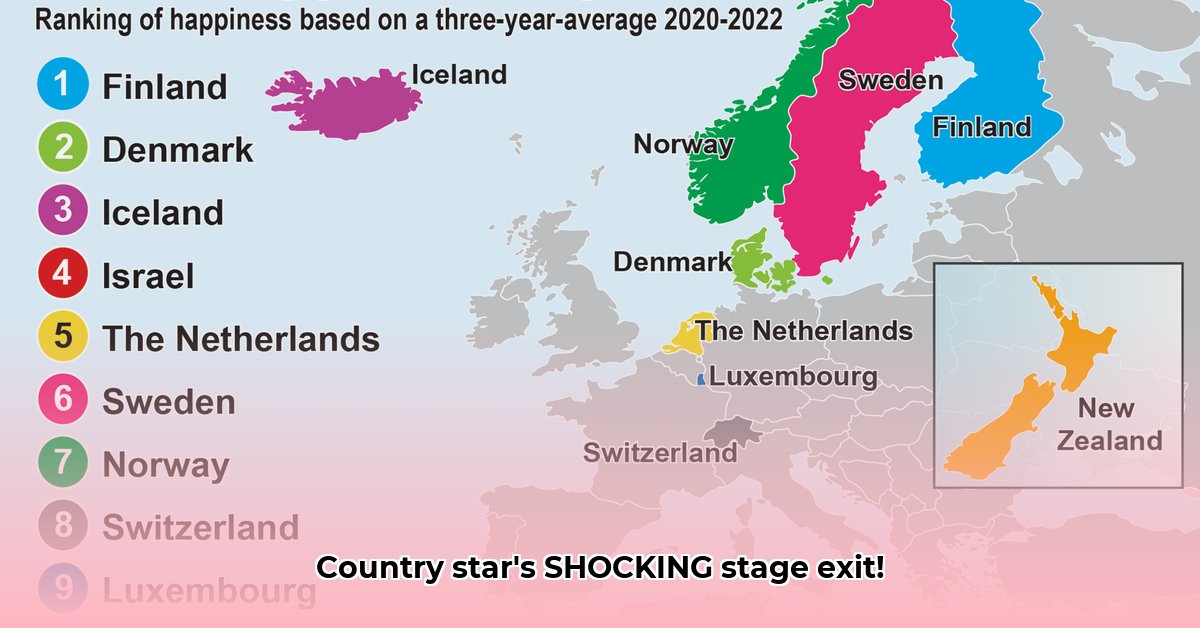The vibrant energy of country music concerts can sometimes be disrupted by unexpected events, with a concerning rise in incidents of artists walking off stage due to unruly audience behavior. This trend raises critical questions about concert safety, artist well-being, and the overall fan experience. What’s driving this increase in walk-offs, and what comprehensive measures can be implemented to ensure a secure and enjoyable environment for everyone involved?
Unpacking the Stage Exits: Factors Contributing to Concert Disruptions
Several artists have recently cut their performances short, signaling a troubling pattern affecting the country music landscape. In October 2024, Brett Young paused a Detroit concert due to multiple fights breaking out in the audience, expressing his surprise that such incidents would occur at his shows. Similarly, in March 2025, Morgan Wallen abruptly left the “Saturday Night Live” stage, later posting a cryptic message on social media, although reports indicated his departure was routine for him. While the reasons for Ronnie Dunn’s premature exit from an Indianapolis concert remain unclear, these incidents collectively highlight potential issues stemming from:
- Aggressive concertgoers: Rowdy individuals disrupting the performance and creating a hostile environment.
- Security vulnerabilities: Inadequate security measures failing to prevent or de-escalate conflicts.
- Impact on artist and fan experience: Compromising the safety and enjoyment of both performers and attendees.
These sudden departures can negatively impact ticket sales, artist appearances, and the perception of safety at country music events. Contributing factors may include excessive alcohol consumption, insufficient security personnel, and the potential for performers to unintentionally provoke the crowd.
- Unruly crowd behavior leading to disturbances and potential injuries.
- Artists feeling unsafe and unable to perform due to audience actions.
- A diminished concert experience for all attendees due to disruptions.
Robust venue security and effective crowd control are paramount. This includes improved crowd management strategies, a sufficient number of well-trained security personnel adept at conflict resolution, and surveillance systems to proactively identify and address aggressive behavior before it escalates.
Comprehensive Strategies for Concert Security: Prioritizing Safety and Enjoyment
Addressing concert safety requires a multi-faceted approach that integrates enhanced security protocols, responsible alcohol management, performer awareness, and proactive risk assessment. Creating a culture of safety is essential for both performers and fans. How can the industry collaborate to improve concert safety and prevent future disruptions?
- Enhanced Security Measures: This extends beyond simply increasing the number of security personnel. It involves providing comprehensive training in de-escalation techniques, implementing advanced crowd control strategies, and utilizing state-of-the-art surveillance technology.
- Responsible Alcohol Management: Implement responsible alcohol sales policies, such as limiting the number of drinks per purchase, establishing designated alcohol-free zones, and ensuring readily available water stations.
- Performers’ Roles and Responsibilities: Encourage artists to incorporate safety messages into their performances, make pre-show announcements emphasizing respectful behavior, and provide training on de-escalating tense situations from the stage.
- Proactive Risk Assessment: Conduct thorough risk assessments before each concert, considering factors such as the artist’s history, expected crowd size, and potential triggers for disruptive behavior.
While enhanced security measures and stricter alcohol control may impact venue profitability in the short term, the long-term costs of inaction, including potential lawsuits, reputational damage, and the cancellation of future events, are far more significant.
Venue Security Protocols: Proactive Measures for Prevention and Protection
Recent incidents involving country music stars walking off stage underscore the importance of robust security planning and effective crowd management. Proactive measures, including pre-event risk assessments, comprehensive staff training, and post-event analysis, are crucial. What specific steps can venues take to prevent these situations and ensure the safety and well-being of both performers and attendees?
Effective strategies include:
- Implementing stringent entry procedures, such as thorough ticket scanning, metal detectors, and bag checks.
- Developing detailed crowd control plans with clearly defined entry and exit points, adequate staffing levels, and designated emergency routes.
- Utilizing CCTV and other surveillance technologies to monitor crowd behavior in real-time, allowing security personnel to respond quickly to potential threats.
- Establishing clear communication pathways between security personnel, event staff, and emergency services to ensure a coordinated response in the event of an incident.
While technology plays a crucial role in enhancing security, human judgment and timely intervention remain paramount. Venue owners and event organizers share a legal responsibility for ensuring compliance with all applicable safety regulations, including maintaining appropriate staffing levels and implementing comprehensive security measures.
The Impact of Alcohol Consumption: Mitigating Risks and Promoting Responsible Behavior
The recent walk-off incidents raise critical questions about the impact of alcohol consumption on audience behavior at country music concerts and festivals. Excessive intoxication can contribute to increased aggression, disruptive behavior, and a compromised concert experience for both performers and attendees. How does alcohol influence the concert atmosphere, and what proactive steps can be taken to mitigate its negative effects? How can we address the Impact of Alcohol Consumption on Audience Behavior at Country Music Festivals?
Many on-stage incidents are directly or indirectly linked to alcohol-fueled audience behavior. The country music genre’s cultural associations with alcohol can further complicate the issue. What tangible steps can be taken to create safer festival environments and promote responsible drinking habits?
Strategies for creating safer festivals include:
- Enhanced security measures, including increased security personnel and improved surveillance systems.
- Increased availability of medical personnel and first aid stations to address alcohol-related emergencies.
- Clearly communicated responsible drinking policies, including designated driver programs and reminders about moderation.
- Designated sober zones or alcohol-free areas within the venue to provide a safe and comfortable space for attendees who choose not to drink.
What collaborative efforts can the industry undertake to address the complex relationship between alcohol consumption and concert safety? These are critical avenues for exploration, as careful consideration of these factors can significantly reduce the risks associated with alcohol consumption and contribute to a safer, more enjoyable concert experience for everyone.
- In Home Voice Lessons Near Me Offer Expert Instruction - February 2, 2026
- Find Voice Teachers for Adults Near Me to Start Singing Confidently - February 1, 2026
- Local Voice Coaches Unlock Confidence and Technique for Singers - January 31, 2026










